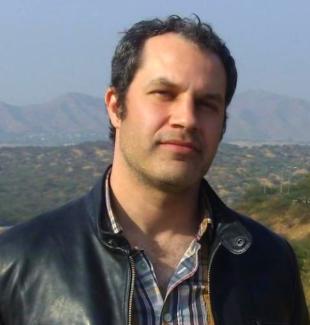
Please tell our readers a little bit about yourself. Where are you from? Can you share with us something about your childhood, and what decisions or choices led you here?
I'm from rural California, and it was only in my last year of high school that I was exposed to South Asia through novels in an English literature class. This sparked an interest in visiting India, and while an architecture student at UC Berkeley, I began to study Hindi-Urdu. After a few years of study, Hindi-Urdu took over, and I ended up graduating in the Department of South and Southeast Asian Studies.
What are your research interests? Where are these interests rooted?
I work primarily on Hindi and Urdu literature, and that too from the pre-colonial period (so on dialects like Brajbhasha, Avadhi and Marwari). However, I'm also interested in literary culture in general, particularly in book history-which is really a combination of literary history, material history, and media studies. Lately I've also gotten into aesthetics, caste and social history.
What are you working on at the moment?
This semester I'm teaching a class on South Asian aesthetics (not just literary but also visual, musical, religious, political, sexual, etc.) so I'm reading a lot of Indic but also Indo-Persian sources on these topics. As for my own research, I'm looking at the religious and literary culture of merchants in early modern (sixteenth- through eighteenth-century) Rajasthan.
What sort of transformations or developments do you hope to see within your field in coming years?
The fields of digital humanities and computational social sciences have enormous potential, and researchers in South Asia have much to gain from new techniques and technologies emerging there. I'm involved in a couple of projects that seek to connect researchers of literary, religious and historical material and allow them to share information, aggregate it, and use it for different purposes. It will be an exciting time of experimentation with new tools and methods over the coming years.
What courses are you teaching this semester? What courses are you teaching in the future?
This semester I'm teaching a seminar on South Asian aesthetics-we are reading texts in translation from Sanskrit, Persian, Tamil, Hindi-Urdu, Bengali, and other languages that attempt to explain how art and literature 'work', and putting these into conversation with sources from the Western intellectual tradition. We're also doing a fair number of case studies in which we apply these theories to pieces of art, music and literature from not only South Asia but also other places, including the contemporary US.
Next semester I'll be teaching a course that deals with some aspect of Hindi literary history-the exact subject matter still needs to be worked out.
The folks in the Department have been very welcoming and helpful. Exploring the city-sometimes on purpose, sometimes by accident-has been pleasant and rewarding. Philadelphia has such a rich history-of struggle and conflict, as well creativity and fraternity-that I'm just starting to discover. I've also been happy to encounter the vibrant art, performance and music scene here in Philly-have been seeing lots of shows and concerts, most of them free.
What are some of your other interests, outside of academics?
As a student, I was involved in student activism; am now transitioning to labor and education activism. Am also hoping to find some other musicians to play with here in Philadelphia (which shouldn't be too hard given what I've seen)!
